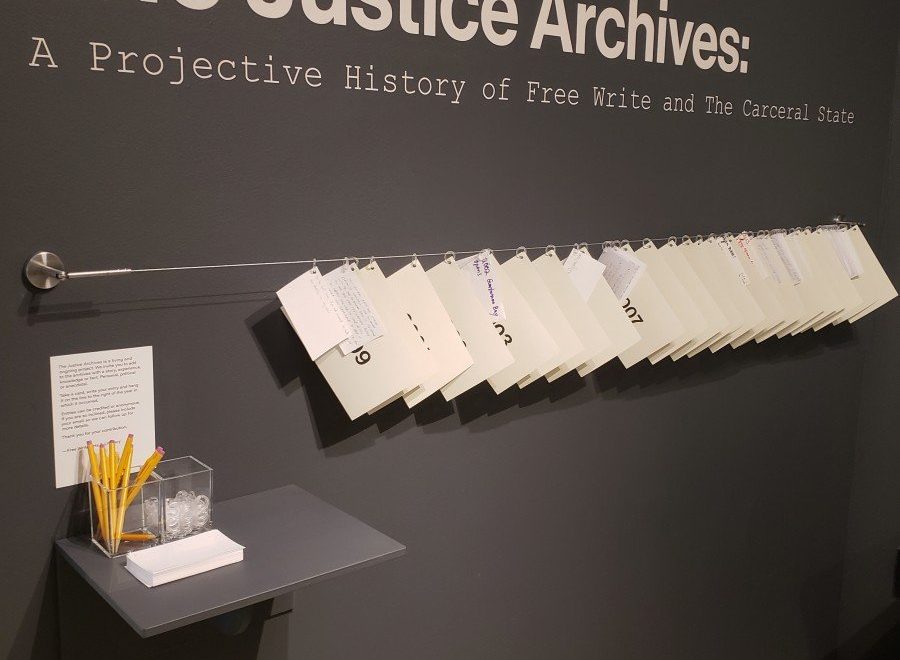Free Write’s Justice Archive at the Envisioning Justice Exhibition
New Visions Beyond Incarceration by Chicago Artists & Communities
August 6 – October 12
Sullivan Galleries
School of the Art Institute of Chicago
Envisioning Justice shares the work of Chicago artists and communities as they visualize, actualize, and reimagine strategies, policies, and approaches in the service of a society that is just for all.
Featuring artwork, ephemera, and documentation from seven Chicago communities impacted by incarceration and works by artists whose practices respond to such themes, this exhibition interrogates the failures of our criminal justice system while presenting plans toward self-empowerment and communal liberation.
Free Write’s contribution to the Envisioning Justice exhibition:
THE JUSTICE ARCHIVES: A PROJECTIVE HISTORY OF FREE WRITE AND THE CARCERAL STATE
Chelsea Ross, Free Write Arts & Literacy Curatorial Director
The Onion recently published an article with the headline: “Tips for Staying Civil While Debating Child Prisons.” The lead photo is a child surrounded by chain link fence, inside a newly-erected immigration detention facility, watching television as a guard looks on. The internment of immigrant children in America is currently one of the “hottest” news topics as I write this on Wednesday, July 3, 2019. As it should be. Especially on the heavily left-leaning algorithm of my social media feeds. Which is exactly why the sardonic Onion headline hit so hard.
Incarcerating, locking-up, detaining (name it what you will) children in America is nothing new. It’s been a specific practice in this country for 120 years, to be exact, with the first court dedicated to juveniles right here in Chicago.
Free Write Arts & Literacy has been working within these systems and with criminalized youth since 2000, providing arts and literacy education, technical skill acquisition, and employment opportunities to the youth who enter our classroom and community spaces. In this time, we have also worked to instigate thought, conversation, and action around the fact of youth incarceration. This happens largely through the publication and exhibition of student work, as well as public-facing programming. It’s from these efforts that the need for the Justice Archives arose, first in 2016.
We realized, after years of watching individuals engage with our students’ work with a wealth of sympathy but a lack of personal agency or ownership, that the general public is unequipped to have thoughtful conversations, let alone heated or civil debates about our (as in, it’s all of ours) youth incarceration practices. The fact is that the public is generally uninformed, uneducated, and unable to find access points to meaningful discussion or action around incarcerating youth. And these are the care-enough-to-go-to-an-art-show-by-kids-in-jail, well-intentioned type of individuals; the same kind of individuals who have been sharing news stories and think pieces about the internment of immigrant children with righteous rage.
So, as is intrinsic to Free Write’s pedagogy, we responded to a need with a tool.
THE JUSTICE ARCHIVES
While the Justice Archives looks like a timeline, it is actually more of a time-web. Simultaneously historical and ahistorical. Its intention is to document, educate, and inform through tracing histories, but also drawing connections. Connections such as this: The attitudes and policies that allow for the detainment of immigrants and immigrant youth are the same as those that allow for the incarceration of disproportionately black and brown youth in our cities. Connections like: The judge who sentenced the police officer who killed 17-year-old Laquan MacDonald to 6.75 years in prison is the same judge who gave a former Free Write student 31 years at the age of 16.
Within and around the Justice Archives, visitors to our gallery will find a selection of visual artwork and poetry produced by Free Write students, as well as a complete collection of Free Write publications. The goal is to present an overview of the scope, evolution, and impact of Free Write’s work within the complex and ever-changing social, political, and bureaucratic systems that Free Write staff and students constantly navigate and challenge. The Justice Archives is a living document that relies on first-person narratives and the experiences of survivors of incarceration, activists, stakeholders, educators, policy makers, and community members to trace each thread in the dense web of decisions that give rise to youth incarceration.
Our hope is that you are able to engage with this work with deeper and more complex understandings of the context and systems within which it exists, and that you are able to see your own place and role in these systems. Our hope is that you are able to walk through and away from this space feeling equipped to not only take a position, but also to take action.
Thank you to our colleagues at Illinois Humanities for their continued support and leadership.
The Justice Archives was researched and organized by Free Write Arts & Literacy Associate Director Mathilda de Dios. Graphic design by Normal Studio. Curation and exhibition design by Chelsea Ross.



